- Home
- Andy Andrews
The Lost Choice Page 2
The Lost Choice Read online
Page 2
“No, Father,” the boy stammered.“I was—”
“Were you intending to lose the bird?”
“No.”
“Did you remember your father and his rule as you set Skei to flight?”
“Of course not!” Kasi declared. “I would never have done such a thing had I remembered your rule!”
Alem was quiet.
“That is not true,” Kasi finally said. “I did remember your rule. I remembered your rule, and I did it anyway. And I don’t know why. I am now quite certain that I do not understand myself.”
Alem chuckled and gave the boy a hug. “You are only eleven summers,my son. There are grown men who struggle mightily with this concept. The result you are seeking is not mere understanding, but control. It is not enough to recognize what is right and true. One must control the impulse to do what is wrong and easy. Nothing will withstand a person who can conquer himself.”
For a long time they rode without talking. Kasi thought about all his father had told him. He listened to Biba. Her feet made a squishing noise as they stepped through the sand and her breathing contained a small whistle. He could smell the saltiness of his father mingled with the mellow aroma of the cardamom and the sweetness of the cassia. And occasionally, he caught a whiff of Biba.
Alem moved his head forward and whispered in his son’s ear.“Kasi?”
“Yes, Father,” came the soft reply.
“Where are your thoughts leading you?”
“To your possession, Father. Will you tell me what it is?” Alem was silent at first. When he spoke, he did so carefully in a voice just above a whisper.“It is an object of fear and an object of promise. An object of ridicule and of power. The possession displays abject poverty and incredible wealth. It contains death and birth and blindness and sight. And one day, it will be yours to protect.”
Kasi shifted his weight as he took all this in. “If you won’t tell me what it is, then what does it do?”
“I told you exactly what it is. As for what it does? It does nothing. It does, however, represent the power to do everything. It is believed and doubted, contemplated and ignored, pursued and avoided. Men will kill for it . . . and I would die to protect it.”
“Where did you get it?”
“From my father many years ago.” Alem cleared his throat. “He was entrusted with the possession and kept it hidden for many years. It was the only thing he left me, and it will be the only thing I am able to leave you, Kasi. It is a gift from a father to his son.”
Kasi was more confused than ever.“Father,” he questioned, “why do we have to keep the object hidden? And if we can’t use it, what good is it anyway?”
“Pay close attention, my son,” Alem began. “There will come a time when the possession will be revealed to all. On that day, everything will change. Kingdoms will rise and fall . . . in a day! You must know that there are men who would die to make this happen and men who would die to prevent it from happening.
“The possession itself—the object—will never, alone, do anything. Even as you gain full knowledge of its history and destiny, it will do nothing but remain tied to your body. Kasi . . . turn around. I want to look at you.” Alem picked up his son by the arms and helped him turn completely around—he was riding backward, but facing his father.
“My son,” Alem said as he placed his hands on Kasi’s shoulders and stared intently into his eyes, “an article of wood or metal or glass can achieve nothing. Set on a mantel in a fine home or on a mountaintop for all to see, it will never, by itself, plow a field or tend a sick person or cook a meal. An object can inspire, arouse, prove, encourage, justify, and confirm. But it can never produce.
“It is only by your hand that the mind’s choices bear fruit. Intentions are like physical beauty—they mean nothing. At some point, a person must actually do something. One’s beliefs must become works. By your hand, you establish evidence for others in the truth of what you believe.”
Suddenly Biba violently threw her head to the side and stumbled to her knees. A scream from the end of the caravan pierced the calm night as the sand behind and in front of the Bedouins erupted with men brandishing swords, shooting bows, and shrieking at the top of their voices!
Biba slowly rolled over on her side, an arrow through her neck, as Alem released Skei and swept Kasi from the dying camel.“Slavers, Kasi!” he yelled.“Roman slavers! Dig a hole under Biba! Quickly!”
As chaos raged around them in the darkness, Alem and Kasi hurriedly dug a trench in the sand alongside and under the camel. Men were running, swords were flashing and the boy heard the whistling rush of arrows being loosed as he looked up to see a man surrender. His father pushed him into the hole and said, “Dig in! Hide!”
On his knees behind the dead camel and the scattered baskets,Alem drew a sword from the folds of his burnoose. With a rapid jerk, he cut the bundle from his chest, sliced the cord binding it, and rolled the possession fully exposed onto the ground. It came to rest mere inches from Kasi’s face. Despite the bedlam raging around him, the boy’s eyes opened wide and his jaw dropped. Then his father took the sword and hacked it to pieces.
In three swift strokes, Alem severed the object into four parts. Horrified, Kasi yelled,“You destroyed it!” and started to scramble out of his hole.
Alem grabbed him and shoved him roughly back in. “Stay down, Kasi! The possession can never be destroyed! Everything I have told you will come to pass, but the time is not now. These men must not find it here! Take this,” he said and placed a piece of the possession in Kasi’s hand. “I love you,my son!”And with those words,Alem grabbed the dead camel and with a desperate effort pulled the animal completely over his boy.
Uncomfortable and terror-stricken, Kasi lay still, barely able to breathe, listening to the fighting just above him. And just as suddenly as it had begun—it was over—quiet except for the barked commands of someone whose language he did not understand. He heard them moving off into the distance. Then silence. The entire attack had taken less than three minutes.
For a long time Kasi lay there. He was unsure of what to do. Finally, dizzy from the heat and lack of oxygen, the boy dug himself out. It wasn’t easy, but by displacing sand and inching his arm out first, he was able to escape the hiding place that had saved him from . . . what?
Kasi stood up and looked around. The sun was rising in the eastern sky. He saw two more camels dead. And four human bodies, stripped of their robes, lying facedown in the sand. Fearfully, the boy crept over to the dead men. Glancing around, he knelt beside them. Three of the men, he saw, had long, full beards, but the fourth . . . he crawled over and turned the head.
It was not Alem.
Kasi stood up. So his father was not dead. Had he escaped? Was he captured? He heard a movement behind him and, startled, wheeled around to face it. Skei, he saw, had returned, landing on the back of her old friend Biba. Kasi looked at his fist, still tightly closed, and slowly opened it. A piece of the possession. A gift from a father to a son.
Near the dead camel, he saw that the other pieces of the possession were gone, but he found a shredded remnant of the burgundy linen and rolled it carefully around the piece that remained, tying it with black cord. Using a short strap of leather from Biba’s halter, he wound it around his left shoulder and neck, then secured it to his chest where his eyes could watch it and his arms protect it. Always and all the time.
Kasi walked over to the falcon and rummaged around for a scrap of leather. Laying it across his shoulder, he allowed Skei to settle there for a moment. Examining the sunrise, the boy placed the warm rays to his right and strode purposefully to the north.
ONE
DENVER, COLORADO—PRESENT DAY
IT WAS SATURDAY MORNING, SUNNY AND WARM, a perfect June day in Colorado. As Mark Chandler walked into the den, he yawned and looked at his wife who was sitting in the recliner.
Dorry Chandler was the kind of woman people stared at, trying to determine if they thought she was attra
ctive. She was five feet four inches tall if she stood on her tiptoes to be measured, which she was apt to do, and weighed an even one hundred pounds. Her red hair was accented by a sprinkling of freckles on her face. Mark walked over and kissed his wife on the top of her head.
“What time did you get in?”
“Late—eleven-thirty. Plane was delayed out of Dallas.”
“Sorry I didn’t wait up,” Mark said as he sat on the arm of the chair.“Other than the late flight,was the trip okay?”
“Yeah, you know,” Dorry shrugged.“Did the interview. In and out. No big deal.”
“Do you have to go to the office today?” he asked.
“Nope. Wrote the article flying in and e-mailed it to the office last night while you snored.” She messed up his hair and headed for the kitchen.“Coffee?” she asked.
“Sure, thanks,” Mark said as he followed her in and sat down at the breakfast table. A Denver police officer in his fourteenth year, Mark was exactly two years older than his thirty-seven-year-old wife. He was average in height and build with dark, curly hair that occasionally grew over his ears. And that was okay. He was a detective sergeant and could get away with it.
The first day he had seen Dorry, she was arguing with his partner, who, at the time, was trying to give her a speeding ticket, and she was refusing to accept it. Standing at the rear of Dorry’s beat-up white Buick LeSabre, Mark had been laughing so hard that his partner finally walked back to him and, fuming, handed him the ticket book. It had taken Mark about five more minutes to calm Dorry down and convince her to sign the ticket, but that was all the time it took for Mark to fall in love.
It had taken Dorry a bit longer to admit she was attracted to a policeman. After all, she was a newspaper reporter and had spent a great portion of her adult life fostering deep reservations about authority. In any case, they were married less than a year later and had their only child, Michael, six years after that.
Now Mark asked his bride of eleven years a familiar question.“How many cups have you already had?”
“Sixty or seventy. But I’ve only been awake a couple of hours. Don’t start.”
Mark had a theory about his wife and her personality as it related to coffee consumption. Simply put, he believed that while others might exhibit type A tendencies or be labeled a “driver” or “choleric” or one of the other terms in current use, Dorry was caffeine. Mark teased about her constant liquid companion, but had long since decided he did not really want her to quit. She would be an entirely different person without it, and he was happy with the wife he had.
“Sheesh!” he said, noticing the clock on the stove. “It’s ten o’clock already. Why’d you let me sleep so late?”
“I don’t know,” Dorry answered. “You seemed tired.” She sat down across from him and slid his favorite mug over. “Anyway, Michael was up early and wanted to play with Jonathan.” Jonathan was seven, the youngest of three children who belonged to their neighbors, Richard and Kendra Harper.
“Where are they now?” Mark asked.“Next door?”
Without moving the coffee cup or taking her eyes off Mark, Dorry smiled and slid her forefinger from the mug handle, pointing it out the big picture window. “In the ditch,” she said.
Defining the boundary of the Chandler’s backyard was a low area, a wet runoff that Mark proudly referred to as “the creek.” Dorry called it a ditch.
Whatever it was, they couldn’t keep their son out of it. Michael was a five-year-old with his mother’s red hair and green eyes and his dad’s personality. Interested in everything, he wanted to know where it came from, how it worked, why it worked, and quite often,what it looked like on the inside! Mark and Dorry had wanted more children, but after years of trying to conceive again, they had finally been told by several doctors that it was “an impossibility.”
As Mark looked out the picture window, he saw the bobbing heads of two boys as they knelt, splashed, jumped, and scurried from one area to another. He chuckled and shook his head.“They’d probably roll around in that creek all day if we let ’em.”
“Ditch,” Dorry corrected. “Probably so.” She stood and reached for another cup of coffee.“But we are going to the mall today, remember? Master Michael Chandler needs some summer clothes, and I could use a few things myself.” Mark groaned.“I forgot all about that, but yeah, I guess. We’re still cooking out tonight with Richard and Kendra, right?”
“As far as I know. They said they would cook, so I’m not even thinking about it. You know their deal. When we cook, they bring nothing. Nothing! So tonight, guess what I’m bringing?”
“Nothing?” Mark asked innocently, trying not to laugh.
“That’s exactly right,” Dorry replied. “But I will bring an entire box of nothing.”
A LITTLE LATER, AFTER HAVING BEEN CALLED THREE times by Mark, Dorry whistled once with her hands on her hips and their son tramped through the back door. “Let’s go, buddy. Dad’s in the shower. We’re going to the mall. Are you dirty?”
“No, ma’am.”
Dorry stuck her arm in front of him as he tried to squeeze by. “I didn’t think you were, but I had to ask,” she said. “I just couldn’t see through all that mud covering up your cleanliness.”
“Oh, Mom,” Michael grinned,“don’t be sarcasm.”
Dorry stopped. With her eyes opened wide, she asked, “Where on earth did you learn that word?”
“Daddy. He said it was supposed to be your name. It’s what Grampa wanted to make your name, but Nana wouldn’t let him.”
“Really?” Dorry stifled a laugh.“Remind me to tell you a story about Daddy later. Right now,we have to hustle. Take off your clothes here in the kitchen and run for the tub.”
As the guys were bathing, Dorry poured another cup of coffee and started the washing machine. She turned the water temperature to its highest setting. Forget color. It’s all brown anyway, she thought. Gathering up the clothes, Dorry noticed a heaviness to the blue jeans. Not surprised, she began to empty the pockets. It was something she had done for Mark ever since they’d been married, and now Michael was just like him. Mentally, she categorized the items, placing them on the counter by the sink or straight into the garbage can.
Whatever the heavy thing was, Dorry had to work the pocket inside out. Her hand barely fit into Michael’s undersized pockets anyway and this last item, certain to be the biggest rock yet, seemed truly stuck. Gradually, she was able to reverse the wet cotton fabric and remove . . . something. It wasn’t a rock,Dorry didn’t think. But then again,maybe it was. She turned it over.
It was metal. A bit smaller than her hand, crumpled into a vague rectangular shape, with some kind of small indentions all over it. Old looking, but not rusted. Definitely metal, she decided. Unless it’s a rock.
IT WAS ALMOST A WEEK LATER WHEN DORRY REMEM-bered the “rock.” She had put it in an empty flowerpot on the windowsill above the sink, intending to inspect it more closely when she wasn’t in such a hurry.
Mark found it the following Thursday evening. They always enjoyed the extra hour or so of daylight that summer provided and, most days, spent the time after work outdoors with Michael. From the patio where he and Michael were watching Dorry transplant clumps of daisies, Mark went inside to retrieve the pot.
A moment later, Mark unlocked and opened the window from the kitchen. “Is this the one you want?” he called, holding up the flowerpot.
Dorry glanced up.“Uh-huh. The yellow one.”
Mark stepped through the door.“Do you want whatever this is in the pot?” he asked as he walked over. He shook the pot and made it rattle.
“What?” Dorry looked up.
“This thing.” Mark reached into the pot and brought out the object. “Is this a throwaway?”
Recognition showed in Dorry’s face as she straightened her back and removed her gardening gloves. “I forgot all about that,” she said.“It was in Michael’s pocket last week. I actually meant to show it to you.”
&n
bsp; “So don’t throw it away?”
“Not yet. I want to look at it again. And we’re ready to come in. The mosquitoes are killing us.”
LATER THAT EVENING, THE FAMILY GATHERED IN THE den. “What do we want to talk about tonight?” Mark began. The television sat, rarely used, in the corner. Several years earlier Mark and Dorry had agreed that their jobs kept them current on as much news as they could stand, and neither wanted Michael to grow up with the television blaring constantly. So, unlike other families they knew, the Chandlers had developed a habit of talking.
“Hey, get that thing,”Dorry said.“That thingie from the flowerpot. Where’d you put it?”
“Oh, yeah,” Mark said as he got out of his recliner and headed for the kitchen.“Hang on.” Seconds later, he returned with the object in his hand and a perplexed frown on his face.
“Come here and hold it where we can all see it,” Dorry said as she made room on the couch. “Michael, you sit in Mama’s lap.”
Mark sat down and held the object at an angle to catch the light from the floor lamp. Reaching up to adjust the lampshade, he said,“Where did you say this came from?”
“From Monkey Boy’s pocket,” she answered and gave the child a quick tickle across the ribs. Michael giggled.
Mark looked at his son. “So where did you get it, Monkey Boy?”
“At the creek,” Michael said.
“At the creek? Or in the creek?”
Michael looked thoughtful. There would come a time in his life, particularly as a teenager, when he would notice that the answers his parents required were to be delivered in excruciating detail. This was not Michael’s fault—just a natural byproduct of having a journalist for a mother and a detective for a father. But for now, he was only too happy to reply.
“It was kinda on the side of the creek.”
Mark turned it over.“It’s not a rock. It’s too heavy. Kind of reddish brownish. It’s hard. I can’t nick it with my fingernail.”

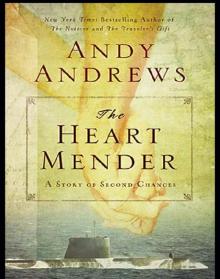 The Heart Mender: A Story of Second Chances
The Heart Mender: A Story of Second Chances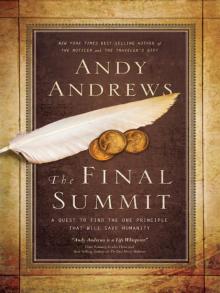 The Final Summit: A Quest to Find the One Principle That Will Save Humanity
The Final Summit: A Quest to Find the One Principle That Will Save Humanity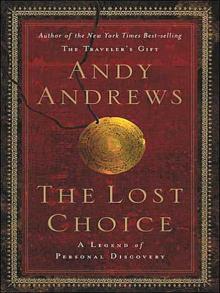 The Lost Choice
The Lost Choice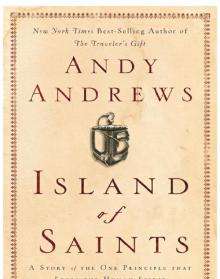 Island of Saints: A Story of the One Principle That Frees the Human Spirit
Island of Saints: A Story of the One Principle That Frees the Human Spirit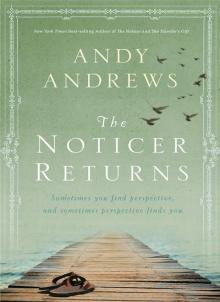 The Noticer Returns
The Noticer Returns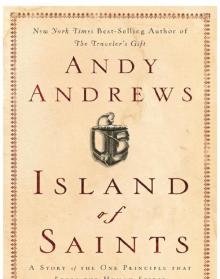 Island of Saints
Island of Saints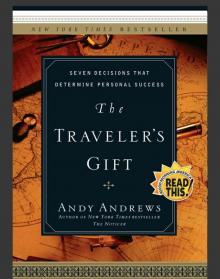 The Traveler's Gift
The Traveler's Gift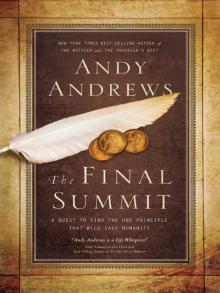 The Final Summit
The Final Summit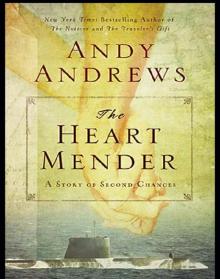 The Heart Mender
The Heart Mender